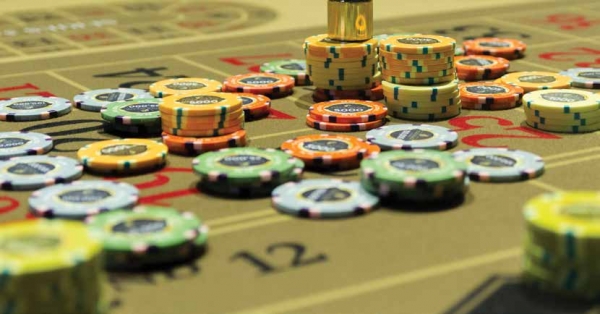The International Association of Gaming Advisors (IAGA) will hold its 37th annual International Gaming Summit during G2E Asia from 14 to 16 May at Four Seasons Macao. Among the many insightful seminars and events that will comprise IAGA’s summit is a responsible gaming workshop to be held on Wednesday 15 May. Inside Asian Gaming catches up with two of the responsible gaming experts playing a key role in the workshop – MGM Resorts’ Alan Feldman and Caesars Entertainment Corp’s Jan Jones Blackhurst – to take an in-depth look at the important issue of responsible gaming.
ALAN FELDMAN – MGM RESORTS
As Executive Vice President of Global Industry Affairs, Alan Feldman oversees the planning and implementation of MGM Resorts International’s policy development on industry issues and programs. He also was a principal architect of MGM’s leading Corporate Social Responsibility efforts and throughout his career has been involved in a wide array of industry issues with a particular focus on responsible gaming. He was elected Chairman of the Board of the National Center for Responsible Gaming in January 2012 and has been a long-serving member of the Advisory Board of the Nevada Council on Problem Gambling.

Ben Blaschke: Firstly Alan, why is it important to promote responsible gaming discussions?
Alan Feldman: The only way our business will thrive over time is to continue to have healthy customers. Someone who is experiencing the consequences of disordered or addicted gambling is not going to be a good customer; not in the short term and certainly not in the long term. Our business is only sustainable if people have fun, can pay their bills and come visit again in the future.
BB: How do you strike a balance between acknowledging the importance of responsible gaming and keeping its prevalence in perspective, given that most players gamble responsibly?
AF: The prevalence of problems associated with gambling have remained constant throughout the past two decades. In that same time, the growth of the legal gambling industry, tribal and commercial, has been extraordinary. The best way we can impact the prevalence rate is to continue to encourage responsible play among our customers.
BB: What are some of the problems you’ve seen in some responsible gaming programs over the years?
AF: I think we were mostly focused on problem players in the past as opposed to focusing and, hopefully, increasing the numbers playing responsibly. Those who have problems need to be encouraged to seek help in whatever form works for them individually.
BB: What should responsible gaming programs focus on in order to be most effective?
AF: We need to have as many conversations with our customers as possible. For the vast majority of the public, we should regularly encourage them to have fun and enjoy themselves and support them in making responsible choices.
BB: Do you believe the intense media focus on problem gambling is disproportionate to the actual problem or is it important to keep that discussion out in the public domain?
AF: It’s very important to continue to have these conversations publicly. Not only will that increase awareness of both problem and responsible gambling, it will also eventually help normalize the conversation and, over time, reduce the stigma associated with problem gambling.

BB: What are some of the common challenges faced in regards to responsible gaming when entering new markets? What impact do cultural differences have?
AF: There is definitely the perception that any expansion of legal gambling will automatically increase problems. This has proven untrue through the years, but it remains a major topic of debate in new markets. As for understanding cultural differences, this remains an area in need of further academic study. By way of example, the South Oaks Gambling Screen, the most commonly used in North America, is now being used in Japan. It has yet to be determined if the answers to such complex questions as “Do you ever feel guilty?” have the same meaning and context in Japanese as they do in English.
BB: Looking specifically at Japan, it is well known that the primary obstacle facing the launch of an IR and casino industry in Japan is public concern over problem gambling. How should the industry as a whole go about addressing the Japanese public?
AF: We must start from known facts: In spite of the vast growth of legalized gambling across North America, the prevalence rates have remained steady. We must always point out that the addition of three IRs in Japan will only increase gambling by a fraction of 1%. We must also prove that the industry is committed to responsible gambling. We must advocate that government must play a role in supporting public education and awareness and taking appropriate steps to ensure the availability of many forms of treatment.
BB: Is there a Japan-specific approach that you believe should be taken in regards to responsible gambling practices?
AF: I think the main focus in Japan should be on research and analysis. The nation has had gambling for decades, centuries even, with scant research available on any aspect of the interaction between the public and gambling. As a result, there is a unique to do some research on how gambling in this current context is seen by new generations of Japanese citizens.
BB: How does MGM view its role in regards to alleviating concerns and initiating responsible gaming programs in its pursuit of a Japan license?
AF: We are a leader in responsible gaming initiatives in the US and plan to take this same energy and momentum with us to Japan. There are exciting new Japanese technologies that, when combined with existing behavioral approaches such as GameSense, may combine to create a new form of responsible gaming programs. It’s all very exciting.
Jan Jones Blackurst – CAESARS ENTERTAINMENT CORP
Caesars Entertainment’s Executive Vice President – Public Policy and Corporate Responsibility is a longtime political and business leader and spent most of the 1990s as one of the most popular mayors in Las Vegas’ history. She then joined Caesars Entertainment, where she and her teams developed the industry’s first Responsible Gaming practices. With Jan’s guidance, Caesars Entertainment has earned a 100% perfect score in the Human Rights Campaign Corporate Equality Index for 10 consecutive years. She helped establish the UNLV International Gaming Institution Center of Excellence.

Ben Blaschke: Why is it important to promote responsible gaming discussions?
Jan Jones Blackhurst: IRs are in business to entertain guests. We want our customers who gamble to enjoy themselves and we should create the kind of environment that promotes responsible play. That requires responsible gaming to be one of the gaming industry’s core values.
RG is a critical business function, particularly for Caesars, which ensures that our business is sustainable. It improves morale among employees, facilitates a positive experience for our guests and plays the vital role of reducing stigma in the communities in which we operate. Every aspect of our business is improved by frank, thorough and objective discussions about responsible gaming.
Our employees are in business to entertain our guests and we want our employees to understand the goal of making sure our guests have fun every time they visit our resorts. Our guests appreciate strategies for playing within their budgets and available resources to help them play responsibly. Our communities benefit from discussions about gambling problems and this helps to alleviate fears and reduce stigma around the issue in jurisdictions considering hosting a casino.
BB: What are the key elements required for an effective responsible gambling program?
JJB: It is important that the industry translate responsible gaming policies into sound business practices. An effective responsible gaming program includes several key components. Underlying all of these components is a commitment to objective science to deliver proven and evidence-based programs and initiatives.
Communication of responsible gaming expectations and ethics to all employees, customers and the public. This includes communication at all customer contact points within gambling venues and via media in the community, giving practical information about skills and attitudes consistent with gambling responsibly, such as encouraging customers to set limits for spending both time and money, as well as information on how to identify a problem and where to get help.
Making meaningful options available to customers who want help managing their gambling, including self-exclusion and selfrestriction.
Responsible Gaming training for all employees. At Caesars, we place particular emphasis on special training for our “Responsible Gaming Ambassadors” who engage with customers whose gambling we’re concerned about.
Support and relationship building in the local community with problem gambling service providers and NGOs that seek to reduce potentially harmful impacts of gambling.
BB: RG programs require input from a number of people across a number of levels within an organization – what are some of the main challenges that can arise in this regard? Is RG generally the responsibility of all employees?
JJB: I don’t think there are any insurmountable challenges as long as there is a commitment from the top of the organization to responsible gaming and the weaving of a responsible gaming ethic into the fabric of the company. We all have our own roles to play in RG – it’s not a function of only a few people, it’s a core component of how we conduct our business and a natural extension of traditional customer service. Responsible gaming impacts every part of operations and informs every interaction with a guest. RG can’t be helicoptered and dropped in to a corporate culture if it’s to be effective. It has to be a shared responsibility that informs every aspect of how we relate to our customers, our employees and the communities where we operate.
All employees must embrace and reflect these values. While it must be a top down approach, it also must be lived and breathed at every level of the organization. At Caesars we understand that in order to effectively promote responsible gaming, we have to behave in a way that’s consistent with our responsible gaming values, policies and procedures every day. That is why we have dedicated teams at every property and at the corporate level that manage and reinforce our responsible gaming ethic to ensure that we adhere to our responsible gaming commitments.

BB: What training is generally provided to give employees the tools they need to play an effective role in the company’s RG initiatives?
JJB: All employees receive RG training, even those who don’t regularly interact with customers. It’s important for all employees to understand the company’s commitment to responsible gaming and the programs it has in place to achieve its RG objectives. Employees in customer-facing roles receive extra training to help them understand their specific roles in promoting RG on the casino floor and at all other customer touchpoints.
A key feature of our program is that employees in customerfacing roles are trained to act on their personal concern for a guest in a situation where responsible gaming may be an issue, as it is both a recognizable state of mind and a potent trigger to move employees to action. Fifteen years ago, Caesars pioneered the concept of Responsible Gaming Ambassadors, who receive special training on how to interact with customers whose gambling may be causing us concern, or when approached with evidence that gambling may be causing harm. At least one Responsible Gaming Ambassador is on the floor at all times, across all our facilities, to fulfill this important duty.
We also provide specialized training based on functional areas; for example, employees in the credit department and casino cage have important duties to make sure transactions don’t violate any of our exclusion or restriction programs and we provide additional RG training to these employees.
BB: How do you keep employees engaged beyond their initial training?
JJB: In addition to requiring regular refresher training, we have Responsible Gaming Committees at each of our properties that make sure our programs are being effectively implemented and that regularly communicate our RG ethic to all of our employees. Employees want to know more about RG and want to play meaningful roles in encouraging it. Our RG Committees leverage and channel that enthusiasm in ways that keep RG fresh and top of mind.
BB: What role does research and data play in modern RG programs and how should it be implemented?
JJB: Caesars’ integrated approach to RG is built on clear objectives, measurable outcomes and scientific research and evidence. While Caesars is proud of its history in creating industry-leading RG initiatives, we’re committed to using the latest scientific research to continually improve and innovate our approach. We continuously review and evaluate our programs and initiatives to promote RG, both internally and externally.
We also seek to continuously improve our knowledge about RG by regularly engaging in dialogue with researchers, scholars, treatment providers, recovering disordered gamblers and other informed stakeholders. Caesars knows that responsible gaming is crucial for a sustainable business and that is why we continually evaluate, invest in and innovate our approach. We believe these efforts help ensure that our RG programs are cutting-edge and provide maximally effective tools for our employees and customers to prevent and address gambling-related problems.

BB: Speaking broadly, are existing responsible gaming programs working?
JJB: There is no question that RG programs are important in attracting, engaging and retaining the best employees or that customers appreciate the options we make available to them to help them manage their gambling. The evidence is overwhelming that customers appreciate our concern for them as it relates to responsible gaming.
Prevalence studies suggest that a constellation of effective RG services – services that include both the programs provided by operators as well as a suite of prevention, education and treatment services provided or funded by government – keep problem gambling levels low despite the introduction of new forms of gambling or new venues for gambling.
Experience has shown that prevalence rates do not increase simply as a result of exposure to new gambling . In fact, when responsible gaming programs are implemented correctly – and coupled with a strong responsible gaming regulatory framework and public awareness campaigns – the introduction of regulated casinos can actually lead to a reduction in prevalence rates. This decline in prevalence seems to be driven by greater public awareness, expanded services for problem gamblers and the resources and institutionalized RG programs that accompany the introduction of casinos.
BB: Looking specifically at Japan, it is well known that the primary obstacle facing the launch of an IR and casino industry in Japan is public concern over problem gambling. How should the industry as a whole go about addressing the Japanese public?
JJB: Japan is fortunate in that there is now a solid foundation for us to understand the effects of IRs on local communities. Fear thrives in the shadows; presenting the facts about IR impacts experienced by scores of communities around the world and bringing casino gambling into the light of objective evidence can alleviate these fears.
I’ve often said that casino gambling is only controversial in the places that don’t have casinos. As a two-term mayor of Las Vegas and as a senior executive for Caesars for two decades, I’ve seen first-hand around the world the economic stimulus that IRs can provide. I know how IRs generate tourism and stimulate capital investment. I know how much fun our shows, our restaurants, our spas and our nightclubs provide. And I know that the vast majority of our customers will enjoy casino gaming exactly as we intend it to be enjoyed – as a form of entertainment.
Dispelling the myths about the effects of casinos is sometimes not easy. But again, there is a wealth of evidence, a plethora of real-world examples, demonstrating that gambling problems are confined to a small proportion of the population, and that this percentage typically doesn’t change after the introduction of IRs. Our job as operators is to be upfront about the programs we have in place to encourage responsible gaming and to make available experts and evidence so that local residents can make informed judgements about whether and how RG programs and IRs should be implemented in Japan.
BB: Is there a Japan-specific approach that you believe should be taken in regards to RG practices?
JJB: Most certainly there is. We’ve been adamant since the outset that IRs in Japan be truly Japan IRs – that while there are many examples from which IR developers can draw from, Japan IRs should reflect and be driven by Japanese culture and Japanese preferences. One size does not fit all when it comes to IR implementation.
The situation is similar with respect to RG practices. Japanese authorities have embarked on a deliberate, thoughtful process to make sure RG programs are tailored to the Japanese context and sensibility. We applaud these efforts because they will ensure that IRs are sustainable in Japan over the long term. Similarly, Caesars understands that existing RG programs that have been proven effective in other jurisdictions cannot simply be translated and implemented. The design and delivery of programs must be created within the context of cultural norms and behaviors within a particular country; therefore, we are undertaking steps to culturally adapt the design and delivery of Caesars’ industry-leading responsible gaming program and materials to ensure that they are informed from a local perspective and tailored to the culture of Japan.
Japan is unique compared to other markets considering casinos in that legal gaming already exists in various forms through pachinko/pachislots and various state sponsored gambling options such as horse racing. The discussion on bringing IRs to Japan has brought the already existing issue of problem gambling to the forefront of national discussions and the government and many civic groups are already taking strides to address a pre-existing problem. Through utilizing the experience and knowledge that IR operators have built up through experience in various other markets, Japan is well positioned to address this pre-existing problem and drive down prevalence rates.





























